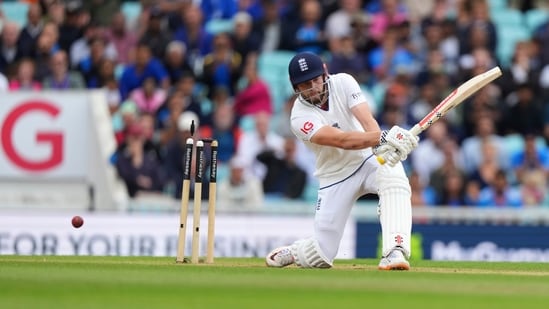The English media showed no mercy after England lost the fifth and final Test against India at The Oval on Monday, as the tourists drew the Anderson-Tendulkar Trophy 2-2. Meanwhile, the Australian media delivered a brutal reality check to Ben Stokes and his team ahead of their upcoming all-important Ashes assignment.
 England’s Gus Atkinson bowled out by India’s Mohammed Siraj on day five of the fifth cricket test match between England and India at The Kia Oval (AP)
England’s Gus Atkinson bowled out by India’s Mohammed Siraj on day five of the fifth cricket test match between England and India at The Kia Oval (AP)
England, at one point, were cruising towards the 374-run target, riding on centuries from Harry Brook and Joe Root. Their 195-run stand for the fourth wicket took them to 301 for three. But their hopes took a major hit on the fourth afternoon when India hit back thrice around the tea break, removing three batters for just 26 runs.
On the final morning, England began positively, hitting back-to-back boundaries with just 35 runs needed. But Mohammed Siraj turned the tide, striking twice in his first two overs before cleaning up the final wicket to complete his five-for. England fell just six runs short — suffering their narrowest defeat on home soil in 123 years.
The Telegraph article titled ‘Chris Woakes’ remarkable act of bravery will be remembered forever’, questioned England’s approach against the Indian seamers, strongly criticising Jacob Bethell and Jamie Smith. It argued that tail-ender Gus Atkinson was the only batter with a clear plan, while the rest “did exactly what India’s seamers wanted them to do—either by throwing the bat at anything and everything, or poking their bats at anything and everything.”
The piece read: “Discipline? Defence? It all went out of the window in the nerves of the occasion. The disease had actually started on the fourth evening when Joe Root played a shot—or dab—which he regretted the moment he had tried it. He had lost the strike as Jacob Bethell struggled to come to terms with a red ball, and after the euphoria of his 39th Test hundred, Root tried something that was unworthy of his reputation. Bethell was given scant chance by England’s selectors.”
The Guardian, on the other hand, in its piece “Are you not wowed? Bazball, India and a one-armed man deliver drama and beauty”, couldn’t stop gushing about India’s heroism on the final morning and Siraj’s fire. It said: “England needed 35 to win and India three and a half wickets to level the series. The players came out to a huge rolling wave of applause, India’s fielders breaking from their huddle to sprint in unison, impossibly heroic already—a group who have given us everything over the past two months. And this was a day for Mohammed ‘the Demon’ Siraj, who really is the most lovable maniac in sport, and who bowled like a god here to win this game.”
England ready for the Ashes?
Since the summer of 2022, when the Bazball era began in England, the Stokes-led side has played 13 Test series and won eight of them. While that tally suggests success for the McCullum-Stokes partnership, the Bazball philosophy has faltered in crucial moments—a drawn Ashes at home in 2023, a 1-4 defeat in India in 2024, and now a 2-2 draw at home against an Indian side that recently saw the retirements of Virat Kohli, Rohit Sharma, and R Ashwin. The most recent result has prompted many—especially the Australian media—to deliver a scathing Ashes verdict.
“Toppling India would have given England a timely boost of confidence ahead of the upcoming Ashes tour, but the lingering Bazball sceptics would grow in volume if Brendon McCullum’s troops failed to win another marquee series,” a Fox Sports article titled ‘Test miracle for the ages as Poms stunned at the death despite one-arm sacrifice’ read. “Regardless, failure to defeat an undermanned Indian team — who are without retired superstars Virat Kohli, Rohit Sharma and Ravichandran Ashwin — is a hammer blow for England’s Bazballers.”
The Sydney Morning Herald noted that England were expected to turn a corner in this series, shifting from crowd-pleasers to serious contenders. But their recurring struggles—especially the inability to manage key fast bowlers—highlighted deeper problems that Bazball alone couldn’t fix.
The article titled ‘The hard truths that show England will struggle to win the Ashes’ read: “It is worth remembering that this was the series in which England were meant to have evolved from entertainers to winners.
They had become more pragmatic in tactics, more inclined to sledge opponents on the field, and more susceptible to the petulance that followed India’s series-saving rearguard in Manchester. Putting on a show was no longer enough.
All those changes were, however, largely cosmetic next to a couple of hard cricket truths. First, winning big series generally requires keeping your best fast bowlers fit, something England have consistently failed to do over many years, not just during the Bazball era that began in 2022.”

